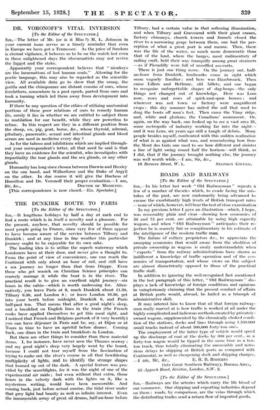ROADS AND RAILWAYS
[To the Editor of the SPECTATOR.] SIR,—In his letter last week " Old Railwayman " repeats a few of a number of theories which, to evade facing the mis- takes of the past, are now customarily being advanced to excuse the exorbitantly high levels of British transport rates —none of which, however, will hear the test of close examination In my previous letter I gave an illustration—which, I hope, was reasonably plain and clear--showing how economies of 50 and 75 per cent. are attainable by using high capacity wagons, and when " Old Railwayman " anticipates their re- jection he is scarcely fair or complimentary in his estimate of the intelligence of the modern traffic man.
The failure of colliery proprietors &c., to appreciate the sweeping economies that would ensue from the abolition of private ownership in wagons is easily understandable when " experts " from the railway administrations have shown so indifferent a knowledge of traffic operation and of the eco- nomics of transportation, and whose views on this subject are almost diametrically opposed to those of the practical traffic staff.
In addition to ignoring the well-recognized fact mentioned in the last paragraph of this letter, " Old Railwayman " dis- plays a lack of knowledge of foreign conditions and opinions in vaingloriously claiming that the present conduct of affairs at British ports would, abroad, be hailed as a triumph of administrative skill.
It may interest him to know that all that foreign railway- men really marvel at is how traffic is worked at all under the highly complicated and ludicrous methods created by privately- owned wagons, supplemented by the chronically choked condi- tion of the stations, docks and lines through using 1,500,000 small trucks instead of about 300,000 forty-ton ones.
The employment of the latter type of vehicle would speed up the discharge of coal at the docks by 300 per cent., as a forty-ton wagon would be tipped in the same time as a ten- ton truck, thus totally eliminating the unenviable and noto- rious delays to shipping at British ports as compared with Continental, as well as cheapening dock and shipping charges, (late Great Southern Railway), Buenos Aires. 25 Appach Road, Brixton, London, S.W . 2.






































 Previous page
Previous page